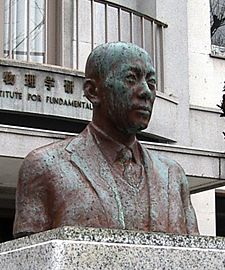Hideki Yukawa
| Hideki Yukawa 湯川 秀樹 | |
 |
|
| Born | January 23, 1907 Tokyo, Japan |
|---|---|
| Died | September 8, 1981 (aged 74) Tokyo, Japan |
| Nationality | Japan |
| Fields | Theoretical Physics |
| Institutions | Kyoto University Yukawa Institute for Theoretical Physics Columbia University |
| Alma mater | Kyoto Imperial University |
| Notable awards | Nobel Prize in Physics (1949) |
Hideki Yukawa FRSE (湯川 秀樹 Yukawa Hideki?, January 23, 1907 – September 8, 1981), née Ogawa (小川?), was a Japanese theoretical physicist and the first Japanese Nobel laureate.
Contents |
Biography
Yukawa was born in Tokyo, Japan. In 1929, after receiving his degree from Kyoto Imperial University he stayed on as a lecturer for four years. After graduation, he was interested in theoretical physics, particularly in the theory of elementary particles. In 1932, he married Sumi (スミ?) and had two sons, Harumi and Takaaki. In 1933 he became an assistant professor at Osaka University, at age 26.
In 1935 he published his theory of mesons, which explained the interaction between protons and neutrons, and was a major influence on research into elementary particles. In 1940 he became a professor in Kyoto University. In 1940 he won the Imperial Prize of the Japan Academy, in 1943 the Decoration of Cultural Merit from the Japanese government. In 1949 he became a professor at Columbia University, the same year he received the Nobel Prize in Physics, after the discovery by Cecil Powell of Yukawa's predicted pion in 1947. Yukawa also predicted K-capture, in which a low energy hydrogen electron could be absorbed by the nucleus.
Yukawa became the first chairman at Yukawa Institute for Theoretical Physics 1953. He received a Doctor, honoris causa from the University of Paris, and honorary memberships of the Royal Society of Edinburgh, the Indian Academy of Sciences, the International Academy of Philosophy and Sciences, and the Pontificia Academia Scientiarum.
He was an editor of Progress of Theoretical Physics,[1] and published the papers Introduction to Quantum Mechanics (1946) and Introduction to the Theory of Elementary Particles (1948).
In 1955, he joined ten other leading scientists and intellectuals in signing the Russell-Einstein Manifesto, calling for nuclear disarmament.
Family
Solo violinist Diana Yukawa (ダイアナ湯川) is a relative of Hideki Yukawa.
See also
- Yukawa potential, an approximation for the binding force in an atomic nucleus
References
- ↑ Yukawa Institute for Theoretical Physics; Gakkai, Nihon Butsuri (1946). Progress of Theoretical Physics. Kyoto: Yukawa Institute for Theoretical Physics and Physical Society of Japan. OCLC 44519062. http://ptp.ipap.jp/journal/. Retrieved on 2008-03-03.
- Profiles of Japanese science and scientists, 1970 / Supervisory editor: Hideki Yukawa (1970)
- Creativity and intuition : a physicist looks at East and West / by Hideki Yukawa ; translated by John Bester (1973)
- Scientific works(1979)
- Tabibito = The traveler / Hideki Yukawa ; translated by L. Brown & R. Yoshida(1982)
External links
- Hideki Yukawa - Biography
- About Hideki Yukawa
- his prediction of the existence of mesons on the basis of theoretical work on nuclear forces.
|
||||||||